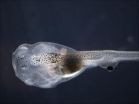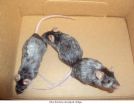(Press-News.org)
VIDEO:
This video shows two episodes in which a bearded capuchin monkey places and strikes a nut with the Stop meridian marked with a black line or a black-hatched line, and...
Click here for more information.
Bearded capuchin monkeys deliberately place palm nuts in a stable position on a surface before trying to crack them open, revealing their capacity to use tactile information to improve tool use. The results are published February 27 in the open access journal PLOS ONE by Dorothy Fragaszy and colleagues from the University of Georgia.
The researchers analyzed the monkeys' tool-use skills by videotaping adult monkeys cracking palm nuts on a surface they used frequently for the purpose. They found that monkeys positioned the nuts flat side down more frequently than expected by random chance. When placing the nuts, the monkeys knocked the nuts on the surface a few times before releasing them, after which the nuts very rarely moved. The researchers suggest that the monkeys may have learned to optimize this tool-use strategy by repeatedly knocking the nut to achieve the stable position prior to cracking it. They conclude that the monkeys' strategic placement of the nut reveals that the monkeys pay attention to the fit between the nut and the surface each time they place the nut, and adjust their actions accordingly.
In a parallel experiment, the scientists asked blindfolded people to perform the same action, positioning palm nuts on an anvil as if to crack them with a stone or hammer. Like the monkeys, the human participants also followed tactile cues to place the nut flat-side down on the anvil.
INFORMATION:
Citation: Fragaszy DM, Liu Q, Wright BW, Allen A, Brown CW, et al. (2013) Wild Bearded Capuchin Monkeys (Sapajus libidinosus) Strategically Place Nuts in a Stable Position during Nut-Cracking. PLoS ONE 8(2): e56182. doi:10.1371/journal.pone.0056182
Financial Disclosure: This study was funded by the National Geographic Society, The LSB Leakey Foundation, and The University of Georgia. The funders had no role in study design, data collection and analysis, decision to publish, or preparation of the manuscript.
Competing Interest Statement: The authors have declared that no competing interests exist.
PLEASE LINK TO THE SCIENTIFIC ARTICLE IN ONLINE VERSIONS OF YOUR REPORT (URL goes live after the embargo ends): http://dx.plos.org/10.1371/journal.pone.0056182
Nut-cracking monkeys use shapes to strategize their use of tools
Monkeys optimize positions of tools, nuts based on their shape for efficient nut-cracking
2013-02-28
ELSE PRESS RELEASES FROM THIS DATE:
Ectopic eyes function without connection to brain
2013-02-28
MEDFORD/SOMERVILLE, Mass. (February 27, 2013) – For the first time, scientists have shown that transplanted eyes located far outside the head in a vertebrate animal model can confer vision without a direct neural connection to the brain.
Biologists at Tufts University School of Arts and Sciences used a frog model to shed new light – literally – on one of the major questions in regenerative medicine, bioengineering, and sensory augmentation research.
"One of the big challenges is to understand how the brain and body adapt to large changes in organization," says Douglas ...
Infusion of stem cells and specially generated T-cells from same donor improves leukemia survival
2013-02-28
SEATTLE – In a significant advance for harnessing the immune system to treat leukemias, researchers at Fred Hutchinson Cancer Research Center for the first time have successfully infused large numbers of donor T-cells specific for a key anti-leukemic antigen to prolong survival in high-risk and relapsed leukemia patients after stem cell transplantation. Both the stem cells for transplant and the T-cells came from the same matched donors.
Reporting results of a pilot clinical trial in the Feb. 27 issue of the journal Science Translational Medicine, researchers describe ...
Risk of heart attack death may increase after adult sibling's death
2013-02-28
Your risk of dying from a heart attack may increase after your adult sibling dies, according to new research in the Journal of the American Heart Association.
"Death of a family member is so stressful that the resulting coping responses could lead to a heart attack," said Mikael Rostila, Ph.D., lead author of the study and associate professor at Stockholm University/Karolinska Institutet in Stockholm, Sweden. "But our results suggest that this association between the loss of a sibling and having a heart attack is more likely to occur some years after bereavement."
The ...
Researchers look to breath to identify stress
2013-02-28
The perennial stress-buster – a deep breath – could become stress-detector, claims a team of researchers from the UK.
According to a new pilot study, published today, 28 February, in IOP Publishing's Journal of Breath Research, there are six markers in the breath that could be candidates for use as indicators of stress.
The researchers hope that findings such as these could lead to a quick, simple and non-invasive test for measuring stress; however, the study, which involved just 22 subjects, would need to be scaled-up to include more people, over a wider range of ...
Modified protein could become first effective treatment for vitiligo
2013-02-28
MAYWOOD, Il. – Loyola University Chicago Stritch School of Medicine researchers have developed a genetically modified protein that dramatically reverses the skin disorder vitiligo in mice, and has similar effects on immune responses in human skin tissue samples.
The modified protein is potentially the first effective treatment for vitiligo, which causes unsightly white patches on the face, hands and other parts of the body. Loyola University Chicago has submitted a patent application for the protein, and researchers are seeking regulatory approval and funding for a ...
Spinal cancer: Guidelines for diagnosis unsupported in patients with lower back pain
2013-02-28
A new systematic review published in The Cochrane Library has raised doubts as to the effectiveness of "red flag" indicators at both identifying and excluding cancer in patients with lower back pain. The authors of the review concluded that most individual red flags were poor at diagnosing spinal malignancies and call for further studies focused on combinations of red flags.
Lower back pain is a common complaint, often with no obvious cause. In around 1-5% of patients with lower back pain, the condition results from a more serious underlying problem, such as a tumour. ...
Screening decisions are better informed when risk information is personalized
2013-02-28
Patients' ability to make genuinely informed choices about undergoing disease screening increases when the risk information that they receive is related to their own personal risk, rather than average risks, according to the results of a Cochrane systematic review. The authors reviewed data from studies, largely on cancer screens, in which patients were provided with personalised risk estimates.
The benefits of screening are not clear-cut. For example, screening can help detect cancer early, leading to successful treatment, but it can also lead to unnecessary treatment ...
Housing improvements should be targeted at those in poorest health
2013-02-28
Improving housing can improve health, particularly when interventions are targeted at those in the poorest health, according to a systematic review published in The Cochrane Library. The authors say their review underscores the importance of targeting those most in need when devising programmes for housing improvement.
Despite a wealth of research linking housing to health, it remains difficult to separate the effects of poor housing from the effects of other socioeconomic factors that influence health, such as poverty. The link could be made more strongly by showing ...
Patients with diabetes at no greater risk for infection
2013-02-28
Rosemont, Ill. – Patients with diabetes were no more likely to suffer infection, deep vein thrombosis (a deep vein blood clot) or other complications following total knee replacement (TKR) than patients without diabetes, according to new research published online today, in advance of its publication in the March 2013 Journal of Bone and Joint Surgery (JBJS).
The study authors sought to determine whether or not blood sugar level (glycemic control) influenced outcome in TKR. Fifty-two percent of people with diabetes have arthritis. Previous studies have found that poor ...
Scientists discover molecule that does double duty in stopping asthma attacks
2013-02-28
BOSTON, MA—Scientists from Brigham and Women's Hospital are on the brink of the next treatment advancement that may spell relief for the nearly nineteen million adults and seven million children in the United States suffering from asthma. The scientists discovered two new drug targets in the inflammatory response pathway responsible for asthma attacks.
The study will be published on February 27, 2013 in Science Translational Medicine.
Researchers studied the lungs and blood of 22 people with mild and severe asthma. They saw that immune cells called natural killer ...
LAST 30 PRESS RELEASES:
Natural selection operates on multiple levels, comprehensive review of scientific studies shows
Developing a national research program on liquid metals for fusion
AI-powered ECG could help guide lifelong heart monitoring for patients with repaired tetralogy of fallot
Global shark bites return to average in 2025, with a smaller proportion in the United States
Millions are unaware of heart risks that don’t start in the heart
What freezing plants in blocks of ice can tell us about the future of Svalbard’s plant communities
A new vascularized tissueoid-on-a-chip model for liver regeneration and transplant rejection
Augmented reality menus may help restaurants attract more customers, improve brand perceptions
Power grids to epidemics: study shows small patterns trigger systemic failures
Computational insights into the interactions of andrographolide derivative SRJ09 with histone deacetylase for the management of beta thalassemia
A genetic brake that forms our muscles
CHEST announces first class of certified critical care advanced practice providers awarded CCAPP Designation
Jeonbuk National University researchers develop an innovative prussian-blue based electrode for effective and efficient cesium removal
Self-organization of cell-sized chiral rotating actin rings driven by a chiral myosin
Report: US history polarizes generations, but has potential to unite
Tiny bubbles, big breakthrough: Cracking cancer’s “fortress”
A biological material that becomes stronger when wet could replace plastics
Glacial feast: Seals caught closer to glaciers had fuller stomachs
Get the picture? High-tech, low-cost lens focuses on global consumer markets
Antimicrobial resistance in foodborne bacteria remains a public health concern in Europe
Safer batteries for storing energy at massive scale
How can you rescue a “kidnapped” robot? A new AI system helps the robot regain its sense of location in dynamic, ever-changing environments
Brainwaves of mothers and children synchronize when playing together – even in an acquired language
A holiday to better recovery
Cal Poly’s fifth Climate Solutions Now conference to take place Feb. 23-27
Mask-wearing during COVID-19 linked to reduced air pollution–triggered heart attack risk in Japan
Achieving cross-coupling reactions of fatty amide reduction radicals via iridium-photorelay catalysis and other strategies
Shorter may be sweeter: Study finds 15-second health ads can curb junk food cravings
Family relationships identified in Stone Age graves on Gotland
Effectiveness of exercise to ease osteoarthritis symptoms likely minimal and transient
[Press-News.org] Nut-cracking monkeys use shapes to strategize their use of toolsMonkeys optimize positions of tools, nuts based on their shape for efficient nut-cracking


